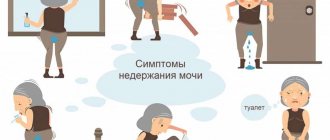General information about male disease
Cystitis in men is an infectious disease. The prevalence of this disease in men is much less than in women. This is explained by the fact that it is more difficult for bacteria that cause the disease to enter the male body. The male urethra is longer, so the infection does not reach the internal organs of men as often as in women.
Cystitis is a disease that affects the genitourinary system, regardless of the person’s gender. The course and symptoms of the disease differ somewhat among representatives of different sexes, although there are common signs. Cystitis in men is a process of inflammation of the urinary system. With this disease, the mucous tissue of the bladder is affected, as a result of which the man experiences discomfort and cannot live a full life.
Manifestations of abnormal bladder activity: painful and frequent urination, the appearance of mucus and blood in the urine, repeated urges to visit the toilet at night. The patient may not immediately see a doctor; this is dangerous because of its consequences. Cystitis can become chronic and lead to other complications. In order not to progress the disease, try to contact experienced specialists at the Global Clinic Center in a timely manner.
How and with what to relieve pain with prostatitis
How to relieve pain with prostatitis
If the pain is caused by an acute process, it will not be possible to quickly and permanently get rid of it until the cause of the disease is eliminated. But you can weaken it. Recommendations are given by the doctor, but in general they boil down to a healthy lifestyle, the absence of hypothermia and bad habits.
Walk if your condition allows
. Chronic prostatitis, including chronic pelvic pain syndrome, according to some data, develops against the background of stagnation. [1] If a man sits for a long time, pressure on the prostate gland increases, and congestion forms in the pelvic area - this contributes to pain and worsening of the condition. The pain after sitting for a long time goes away if a person walks, so patients without exacerbations are advised to maintain moderate physical activity and avoid stagnation. [1] That’s why patients are advised to undergo physiotherapy and prostate massage – they improve microcirculation and prevent stagnation. [2] If we are talking about an acute process, physical activity is contraindicated, especially with temperature and fever. In such cases, it is recommended, on the contrary, to remain in bed, and if there are signs of sepsis such as high fever and body pain, seek emergency help. [3]
Drink more water
. Prostatitis is often accompanied by damage to the urinary tract: pathogens accumulate in the urethra and urethra. Urethritis develops, which only intensifies the symptoms: it is painful for a man to go to the toilet, he feels pain and burning, frequent urges, sometimes false or too intense. [3] This condition also requires medication, but it can be alleviated by drinking plenty of fluids and going to the toilet frequently. During illness, the body needs more water, and frequent urination helps flush bacteria from the urethra and reduce inflammation. During prostatitis, defecation can also be painful: drinking plenty of water will help soften the stool and ease the pain. [1] For the same reason, doctors sometimes include laxatives in the treatment regimen, but they should not be used without the advice of a specialist.
Take painkillers
. Analgesics should not be used before taking tests or visiting a doctor: they can blur the clinical picture. But the doctor may prescribe pain relievers to make the patient feel better. Try not to use medications without serious reasons. In the treatment of chronic pelvic pain syndrome, urologists sometimes prescribe anxiolytics - drugs that help relieve anxiety and depression that occur during a long-term illness. [3] You cannot take such medications without a doctor’s prescription.
Get tested
. The urologist makes a diagnosis based on examinations, and if you have the opportunity and do not want to wait, get tested yourself. To diagnose prostatitis, urine and seminal fluid examinations are needed, not only microscopic, but also bacteriological. [4] It is better to perform a bacteriological study to determine the sensitivity of the pathogen to an expanded range of drugs - this will help the doctor prescribe more accurate treatment. Give the results to your urologist at your appointment. He will decipher them and prescribe drug therapy in accordance with the results of the analysis.
Classification of cystitis
There are several signs that form the basis for the classification of the disease.
By methods of manifestation
According to the methods of manifestation, there are two types of cystitis:
- Spicy
- Chronic
Acute cystitis in men can occur:
- first;
- no more than one case per year;
- with a frequency of 2 or more times every 365 days.
For the occurrence of acute cystitis, there are unfavorable factors in the form of uncontrolled use of certain medications and thermochemical effects on a man. An infection that enters the body of men can also cause certain symptoms characteristic of acute stage cystitis.
The chronic form of the disease can be divided into the following subtypes:
- Latent (symptoms of cystitis in men in this case are smoothed out). The frequency of occurrence of the disease is more than two cases per year, the disease is stable or with rare periods of exacerbations.
- Persistent. The process of inflammation and development of cystitis is diagnosed twice a year or more often.
- Interstitial. This is the most severe form of the disease. Cystitis progresses and can lead to serious complications.
According to the etiology of occurrence
Based on this characteristic, doctors distinguish such forms of cystitis in men as primary and secondary. Primary cystitis is in no way associated with other pathologies of men. This is an independent disease. The secondary form may be the result of problems in the genitourinary system and other organs of the patient. Men with prostate adenoma, diseases of the spinal column, abnormal development of the bladder, or ingestion of foreign fragments should be prepared for this kind of disease.
By localization of inflammation
Cervical, diffuse, trigonitis, focal form of cystitis - this diagnosis is made depending on the location of the source of the disease. Each type of disease is characterized by its own symptoms: with cervical cystitis, urine cannot be retained, the patient often “runs” to the toilet; the diffuse form is characterized by the extensive spread of inflammation; With trigonitis, clots of blood and pus appear in the urine.
Treatment of urethritis, cystitis, prostatitis
All three of these diseases are diagnosed by ultrasound and laboratory urine tests. Urethroscopy is less commonly used. For treatment, antibiotics and antimicrobial agents, drugs to strengthen local immunity, and physiotherapy are used.
If you want to get a doctor’s advice on how to distinguish prostatitis from cystitis, undergo an examination and get rid of the disease, make an appointment at the Dr. AkNer in Moscow! This is an advanced center for urology, gynecology and reproductive medicine, where the most modern diagnostic technologies and treatment regimens are used. It’s easy to make an appointment with a doctor directly on the website or by phone!
Urologist, andrologist Akopyan Nerses Grigorievich.
Back to list of articles
Causes of cystitis in men
Cystitis is most often provoked by various infections that penetrate the male body. The bladder, which contains intestinal, Pseudomonas aeruginosa, tuberculosis bacilli, staphylococci, gonococci, begins to malfunction, and inflammation of various etiologies and localization occurs. There are many unfavorable factors for the appearance of cystitis in men:
- weak immune system;
- powerful radiation exposure of men;
- allergy;
- prolonged and severe hypothermia;
- presence of infections;
- injuries in the bladder area.
Frequent stress, excessive passion for work, smoking, alcohol, and a disordered sex life have a detrimental effect on a man. Men who have undergone unprofessional surgical intervention in the area of the urethra and bladder should be warned about possible negative consequences. Trusting the professional doctors from the Global Clinic Center is the first step towards a successful solution to the problem.
Why does bladder inflammation occur?
Bacterial cystitis occurs when bacteria enter the urinary tract and begin to actively multiply there.
The causative agent of inflammation can be E. coli, chlamydia, Candida fungi, ureaplasma and other pathogenic microorganisms.7, 16 Pregnant and sexually active women are especially susceptible to developing the disease. The use of membranes, diaphragms and other contraceptives containing spermicides can significantly increase the risk of disease. In the presence of pathologies of the immune system, some gynecological and urological diseases, and prolonged catheterization, the incidence of bladder inflammation also increases.7, 16
Symptoms of male cystitis
The most common symptoms of cystitis in men are:
- Frequent (often with difficulty and pain) urination.
- Change in urine odor.
- Presence of pus and bloody discharge in the urine.
- Burning and itching when urinating.
Specific symptoms may be accompanied by general negative signs: weakness, decreased ability to perform usual work, painful manifestations in the groin, scrotum, bladder, increased body temperature. A man with cystitis becomes nervous, irritable, vulnerable to other diseases - the presence of these symptoms varies from person to person. The intensity of the signs of the disease increases along with the neglect and progression of cystitis.
Diagnostics
The success of treatment largely depends on timely diagnosis. Modern methods of diagnosis are used by medical specialists from the Global Clinic Center. The doctor who conducts the appointment carefully listens to the patient’s complaints, taking an anamnesis of the disease. After this, the patient will be asked to do a urine test. The Nechiporenko method and bacterial culture are effective diagnostic methods.
The speed and smoothness of the process of urine passage through the urethra and other organs of the excretory system can be determined by the uroflowmetry method. The use of an endoscope in cytoscopy makes it possible to examine the bladder from the inside. This method gives an accurate picture of possible organ pathologies.
The male type of cystitis can be diagnosed using an ultrasound of the prostate to identify the amount of residual urine. The use of ultrasound to examine the bladder is difficult due to the overcrowding of this organ. A blood test for general analysis is also prescribed to patients to identify the causes of the disease.
Inexpensive and effective herbal tablets for cystitis
Herbal tablets include phytotherapeutic agents, the components of which attack pathogenic bacteria and fungi, eliminate inflammatory processes, which promotes complete recovery. The most popular remedies are 2 medications:
- "Canephron" - tablets based on extracts of several plants - the composition contains rosemary, centaury, and lovage. It is also available in the form of an alcohol solution, but during pregnancy it is better to take tablets. The product has an antiseptic, anti-inflammatory effect, prevents spasms well and relieves pain. Dispensed without a prescription, sold at a price of 450-500 rubles per pack of 60 tablets.
- "Cyston" contains 10 plant substances. They act as an analgesic, anti-inflammatory agent, and provide an antispasmodic, antimicrobial and diuretic effect. It is also available without a prescription and is sold at a price of 570-600 rubles per pack of 100 tablets.
Treatment
Treatment comes down to a whole range of effective measures that must be followed.
Medicines
The main drugs that fight back cystitis are antibiotics. The patient may be admitted to a hospital or take these medications on an outpatient basis. It all depends on how far the disease has progressed. Specific antibiotic preparations are determined by the doctor after determining the cause and nature of the disease and studying laboratory tests. Qualified specialists of the Global Clinic Center will take all measures to ensure that the treatment is as effective as possible. Doctors will prescribe medications against infections if this is the cause of the disease. For severe pain, effective painkillers will be recommended.
Phytotherapy
Decoctions of herbs that have a diuretic and anti-inflammatory effect will complement drug treatment. For cystitis, brew bearberry, lingonberry leaf, and horsetail. They will help to quickly relieve inflammation, “expel” residual urine from the bladder, and normalize the process of urination. The use of phytotherapeutic drugs should be discussed with your doctor and used in combination with medications.
Physiotherapy
This technique is not suitable for patients with exacerbation of the disease. The disease in a chronic form or after its acute period has passed can be treated with additional physiotherapeutic methods:
- electrophoresis;
- use of medicinal mud;
- treatment with magnets;
- UHF, etc.
Fitolysin® paste – a remedy for pain and inflammation in cystitis
Treatment of infectious forms of cystitis is based on the use of antibiotics that have antimicrobial activity against detected uropathogens. But often, as part of complex therapy, herbal preparations are prescribed along with an antibiotic.7, 16
One of the modern remedies used to treat infectious and inflammatory diseases of the urinary tract is Fitolysin® paste. This is a herbal diuretic, which contains 9 types of plant materials and 4 essential oils.6
Phytolysin® is used to prepare an oral suspension. It is believed that it is in this form that the active components are better absorbed2. The suspension should be taken 3-4 times a day (1 tsp per 0.5 cup of sweet warm water).6
Fitolysin® paste has a diuretic, antispasmodic, and anti-inflammatory effect. It contributes6:
- stopping the inflammatory process;
- relief of frequent urge to urinate;
- relieving pain caused by inflammation.
Phytolysin® paste is usually taken together with an empirically prescribed antibiotic. The course of treatment lasts on average 2-6 weeks, but if necessary it can be extended. The herbal diuretic has contraindications. It may also speed up the elimination of certain drugs through its diuretic effect. Therefore, before prescribing it, you need to consult a specialist.6







